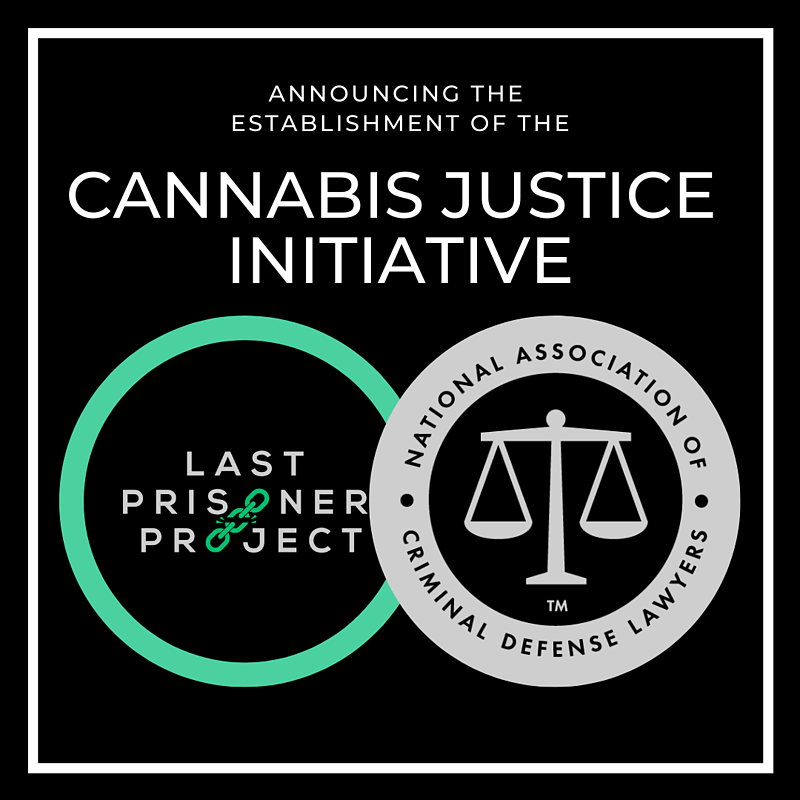LPP and NCDB Establish Cannabis Justice Initiative
Effort Will Focus on Pursuing Multiple Avenues of Relief, Including Clemency, Compassionate Release, Expungement, and Reform, on Behalf of Those Directly Impacted by Cannabis Convictions and Their Collateral Consequences

Despite state-regulated adult-use and medicinal marijuana taking hold across the country, hundreds of thousands of people continue to be arrested and incarcerated for cannabis-related activity. LPP and NACDL are focused on assisting those left behind by these laws — people who continue to face punishment for conduct now legal in dozens of states.
“With the legalization of cannabis sweeping the nation, state and federal actors must prioritize back-end relief for those still suffering under our nation’s unjust and inequitable approach to cannabis policy,” said
Last Prisoner Project Executive Director Sarah Gersten.
“The
Cannabis Justice Initiative will allow LPP and NACDL to scale our efforts to repair these harms by providing the broadest possible relief to individuals senselessly burdened by cannabis-related convictions.”
As it stands, the only legal avenues available to those left languishing in our nation’s prisons and under the yoke of cannabis-related collateral consequences after imprisonment are forms of back-end relief.
To that end, the LPP and NACDL’s
Cannabis Justice Initiative has focused on facilitating
clemency,
compassionate release,
expungement, and
broad policy reform on the local, state, tribal, and federal level.
Clemency is an application to the executive authority for a commutation of a sentence or a pardon. Compassionate release may be obtained via an application to prison authorities or, where statutorily authorized, a motion to the court in which the original sentence was imposed. An expungement is a process of sealing or erasing criminal convictions in the eyes of the court.
The
Cannabis Justice Initiative will recruit, train, and support volunteer attorneys to assist individuals seeking clemency and compassionate release.
Cannabis Justice Initiative provides infrastructural support for local groups helping those suffering consequences for past cannabis convictions.
NACDL and LPP are confident their
Cannabis Justice Initiative will make great strides in creating a world where no one continues to serve time for or remain burdened by the collateral consequences of a past cannabis conviction. The initiative will also advocate for continued reform of criminal drug laws, including legislative provisions that allow for the expansive and standardized expungement of cannabis-related criminal records.
“NACDL has long called for an end to the so-called ‘War on Drugs,” said
NACDL President Chris Adams. “The damage wrought by decades of treating drug use and abuse as a criminal legal system matter rather than as a public health matter is immeasurable—lives, families, communities, all destroyed. This initiative will help right at least some of those wrongs.”
If you are interested in serving as a volunteer or pro-bono attorney for the
Cannabis Justice Initiative, please visit
https://www.nacdl.org/cannabis to learn more.
The
Cannabis Justice Initiative, a joint project of the Last Prisoner Project and the National Association of Criminal Defense Lawyers, will enhance NACDL’s
Return to Freedom Project, a series of programs designed to provide pro bono representation for those seeking relief from harsh sentences and the collateral consequences of convictions. NACDL’s
Return to Freedom Project is led by NACDL Executive Director Norman L. Reimer and Project Manager Steven Logan.






